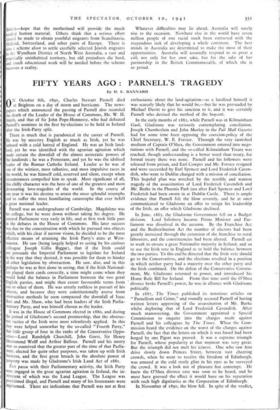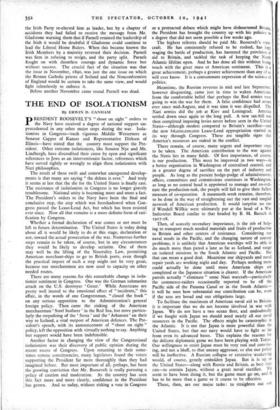FIFTY YEARS AGO: PARNELL'S TRAGEDY
By H. E. BAN NARD
Oo October 6th, 1891, Charles Stewart Parnell died at Brighton on a day of storm and hurricane. The news- papers which announced the passing of Parnell also recorded the death of the Leader of the House of Commons, Mr. W. H. Smith, and that of Sir John Pope-Hennessy, who had defeated Parnell's nominee in the first by-elections to be held in Ireland after the Irish-Party split.
There is much that is paradoxical in the career of Parnell. He was by ancestry English as much as Irish, yet he was imbued with a cold hatred of England. He was an Irish land- lord, yet he was identified with the agrarian agitation which. made certain the downfall of the almost autocratic powers of the landlords ; he was a Protestant, and yet he was the idolised leader of the Roman Catholic Ireland. Leader as he was of one of the wittiest, most talkative, and most impulsive races in the world, he was himself cold, reserved and silent, except when circumstances compelled him to speak. Most significant of all, this chilly character was the hero of one of the greatest and most devastating love-tragedies of the world. In the course of one year it was his destiny to attain the most splendid triumphs and to suffer the most humiliating catastrophe that ever befell a great national leader.
Parnell was an undergraduate of Cambridge. Magdalene was his college, but he went down without taking his degree. He entered Parliament very early in life, and at first took little part in the debates in the House of Commons. His later success was due to the concentration with which he pursued two objects which, with his clear if narrow vision, he decided to be the most effective means of attaining the Irish Party's aims at West- minster. He saw (being largely helped to seeing by his curious colleague Joseph Gillis Biggar), that if the Irish could not persuade the Imperial Parliament to legislate for Ireland in the way that they desired, it was possible for them to hinder all other legislation by obstruction. He saw, also, and in this perhaps he was at first alone in seeing, that if the Irish National- ists played their cards correctly, a time might come when they would hold the balance in Parliament between the two great English parties, and might then extort favourable terms .from one or other of them. He was utterly ruthless in pursuit of his objects, and because they were constitutionally averse from obstructive methods he soon compassed the downfall of Isaac Butt and Mr. Shaw, who had been leaders of the Irish Parlia- mentary Party, and was himself chosen as the leader.
It was in the House of Commons elected in 188o, and during the period of Gladstone's second premiership, that the obstruc- tive tactics of the Irish were most relentlessly applied. In this they were helped somewhat by the so-called "Fourth Party," that little group of four in the ranks of the Conservative Oppo- sition—Lord Randolph Churchill, John Gorst, Sir Henry Drummond Wolff and Arthur Balfour. Parnell and his merry men so contrived that the greater part of the time of that Parlia- ment, elected for quite other purposes, was taken sup with Irish business, and the first great breach in the absolute power of Property was made by Gladstone's Irish Land Act of 1881.
Pori passu with their Parliamentary activity, the Irish Party were engaged in the great agrarian agitation in Ireland, the in- strument of which was the Land League. The League was Proclaimed illegal, and Parnell and many of his lieutenants were prisoned. There are indications that Parnell was not at first enthusiastic about the land-agitation—as a landlord himself it was scarcely likely that he would be,—but he was persuaded by Michael Davitt to give his sanction to it, and it was certainly Parnell who devised the method of the boycott.
In the early months of 1882, while Parnell was in Kilmainham Gaol, Gladstone was seriously contemplating conciliation. Joseph Chamberlain and John Morley in the Pall Mall Gazette had for some time been opposing the coercion-policy of the Chief Secretary, W. E. Forster. Through the very tarnished medium of Captain O'Shea, the Government entered into nego- tiations with Parnell, and the so-called Kilmainham Treaty was reached, though understanding is a better word than treaty, for formal treaty there was none. Parnell and his followers were released from prison, and Earl Cowper and Mr. Forster resigned and were succeeded by Earl Spencer and Lord Frederick Caven- dish, who went to Dublin charged with a mission of conciliation. This hopeful plan was wrecked by the terrible and wanton tragedy of the assassination of Lord Frederick Cavendish and Mr. Burke in the Phoenix Park just after Earl Spencer and Lord Frederick had been sworn in at Dublin Castle. There is ample evidence that Parnell felt the blow severely, and he at once communicated to Gladstone an offer to resign his leadership of the Irish, an offer which Gladstone declined.
In June, 1885, the Gladstone Government fell on a Budget division. Lord Salisbury became Prime Minister and Par- liament was dissolved in the autumn. By the Franchise Act and the Redistribution Act the number of electors had been greatly increased through the extension of the franchise to rural labourers, and the constituencies had been altered. Parnell set to work to ensure a great Nationalist majority in Ireland, and so to use the Irish vote in England as to hold the balance between the two parties. To this end he directed that the Irish vote should go to the Conservatives, and the elections resulted in a position in which neither party had a majority over the other party and the Irish combined. On the defeat of the Conservative Govern- ment, Mr. Gladstone returned to power, and introduced his Home Rule Bill for Ireland. From that time until the O'Shea divorce broke Parnell's power, he was in alliance with Gladstone politically.
In 1887, The Times published its notorious articles on " Parnellism and Crime," and roundly accused Parnell of having written letters approving of the assassination of Mr. Burke whilst deploring that of Lord Frederick Cavendish. After much manoeuvring, the Government appointed a Special Commission to enquire into the charges made against Parnell and his colleagues by The Times_ When the Com- mission heard the evidence on the worst of the charges against Parnell, the fact that the letters on which it was based had been forged by one Pigott was proved. It was a supreme triumph for Parnell, whose popularity at that moment was very great. But the triumph did not melt his iciness. One who saw him drive slowly down -Princes Street, between vast cheering crowds, when he went to receive the freedom of Edinburgh, was amazed at the cold steely glint in his eyes as he surveyed the crowd. It was a look not of pleasure but contempt. He knew the O'Shea divorce case was soon to be heard, and he must have guessed the effect it would have on his reputation with such high dignitaries as the Corporation of Edinburgh.
In November of 1890, the blow fell. In spite of the verdict, the Irish Party re-elected him as leader, but by a chapter of accidents they had failed to receive the message from Mr. Gladstone warning them that if Parnell retained the leadership of the Irish it would be doubtful if Gladstone could continue to lead the Liberal Home Rulers. When this became known the Irish Members by a majority reversed their decision. Parnell was firm in refusing to resign, and the party split. Parnell fought on with dauntless courage and dynamic force but without success. The crucial fact of the situation was that the issue in November, 1890, was just the one issue on which the Roman Catholic priests of Ireland and the Nonconformists of England would be certain to take the same view, and would fight relentlessly to enforce it.
Before another November came round Parnell was dead.



























 Previous page
Previous page